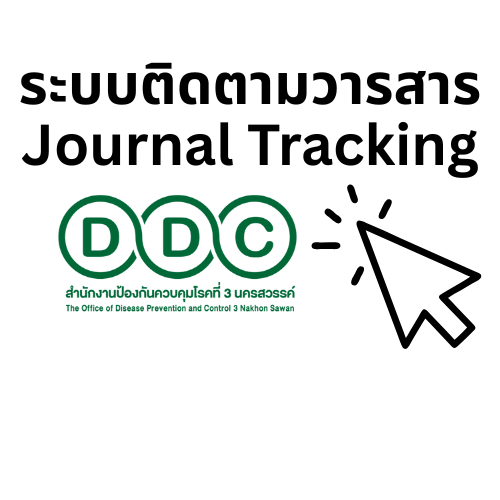Effects of Health Promotion Program on Health Literacy and Prevention Behavior of COVID-19 among Caretaker and Teachers of Children in Early Childhood Development Centers, Nakhonsawan Province
Keywords:
Health Promotion Program, Health Literacy, Prevention Behavior of COVID-19, caretaker and teachers of childrenAbstract
The purpose of this quasi-experimental research pretest-posttest design was conducted to study the effects of health promotion program on health literacy and prevention behavior of COVID-19 among caretakers and teachers of children in early childhood development centers. A sample of 32 caretakers and teachers of children in early childhood development centers in Nakhonsawan provide. The experimental group participated in a health promotion program based on the concepts of Pender’s health promotion model, received 12- weeks includes educating group discussion, practice skills of health literacy 5 skills access, understand, communicate, appraise and apply, exchange learning through Line group and praise the caretaker and teachers of children of the role models. Data were collected through a 3-part questionnaire: personal data, health literacy, and COVID-19 prevention behaviors. Instruments were examined for content validity by qualified experts, Content Validity Index (CVI), yielding values of 0.95 and 0.97, respectively. Reliability was tested by Cronbach’s alpha coefficient, yielding values of 0.87 and 0.92, respectively. Data were analyzed using descriptive statistics, Paired sample t-tests. Results were as follows; the Mean score on health literacy of the experimental group, after receiving the health promotion program was statistically significantly higher than before at the 0.01 level, and the mean score on COVID-19 prevention behaviors of the experimental group, after receiving the health promotion program was statistically significantly higher than before at the 0.001 level. The findings of this study suggested that this program should be recommended for the prevention of ion COVID-19 in the Early Childhood Development Center.
References
คณะแพทยศาสตร์โรงพยาบาลรามาธิบดี มหาวิทยาลัยมหิดล. ความรู้พื้นฐานโควิด-19 [อินเทอร์เน็ต]. 2563 [เข้าถึงเมื่อ 27 พฤศจิกายน 2564]. เข้าถึงได้จาก:
https://www.niems.go.th/1/UploadAttachFile/2020/EBook/49793_20200325095718.pdf
World Health Organization. Coronavirus disease (COVID-19) pandemic [internet]. 2022 [cited 2022 October 1]. Available from: https://www.who.int/emergencies/diseases/novel-coronavirus-2019
กรมควบคุมโรค กระทรวงสาธารณสุข. สถานการณ์ผู้ติดเชื้อ Covid-19 ภายในประเทศ [อินเทอร์เน็ต]. 2564 [เข้าถึงเมื่อ 27 พฤศจิกายน 2564]. เข้าถึงได้จาก: https://ddc.moph.go.th/viralpneumonia/
กรมอนามัย กระทรวงสาธารณสุข. กรมอนามัย เผย เด็กเล็กติดเชื้อโควิดสะสมกว่า 3 หมื่นราย แนะศูนย์เด็กยกระดับป้องกันด้วย ATK [อินเทอร์เน็ต]. 2564 [เข้าถึงเมื่อ 25 พฤศจิกายน 2564]. เข้าถึงได้จาก: https://pr.moph.go.th/print.php?url=pr/print/2/02/163509/
กรมอนามัย กระทรวงสาธารณสุข. คู่มือการปฏิบัติสำหรับสถานพัฒนาเด็กปฐมวัยในการป้องกันการแพร่ระบาดของโรคโควิด-19. กรุงเทพมหานคร: สามเจริญพาณิชย์ (กรุงเทพ); 2563.
ศูนย์อนามัยที่ 3 นครสวรรค์. ผลประเมินการตรวจสอบมาตรการป้องกันโควิด-19 ในสถานพัฒนาเด็กปฐมวัย เขตสุขภาพที่ 3. นครสวรรค์: กลุ่มพัฒนาอนามัยแม่และเด็ก ศูนย์อนามัยที่ 3 นครสวรรค์; 2564.
คณะกรรมการพัฒนาเด็กปฐมวัยแห่งชาติ. มาตรฐานสถานพัฒนาเด็กปฐมวัยแห่งชาติ. กรุงเทพมหานคร: พริกหวานกราฟฟิค; 2562.
กรมส่งเสริมการปกครองท้องถิ่น. บทบาทหน้าที่ครูผู้ดูแลเด็ก [อินเทอร์เน็ต]. 2564 [เข้าถึงเมื่อ 27 พฤศจิกายน 2564]. เข้าถึงได้จาก: http://www.dla.go.th/work/e_book/eb6/eb6_3/3km5.pdf
Copeland KA, Duggan AK, Shope TR. Knowledge and beliefs about guidelines for exclusion of ill children from child care. Ambul Pediatr 2005; 6: 365-71.
บงกช เชี่ยวชาญยนต์. การศึกษารูปแบบการเฝ้าระวังโรคติดต่อในศูนย์พัฒนาเด็กเล็ก จังหวัดตรัง. สงขลา: สำนักงานป้องกนควบคุมโรคที่ 12; 2553.
Louhiala PJ, Jaakkola N, Ruotsalainen R, Jaakkola JJ. Form of daycare and respiratory infections among Finnish children. Am J Public Health 1995; 85: 1109-12
สำนักงานเลขาธิการสภาการศึกษา. แนวแนะวิธีการเลี้ยงดูดูแลและพัฒนาเด็กปฐมวัยตามสมรรถนะ เพื่อเพิ่มคุณภาพเด็กตามวัย 0-5 ปี. กรุงเทพมหานคร: พริกหวานกราฟฟิค; 2561.
อังศินันท์ อินทรกำแพง. การสร้างและพัฒนาเครื่องมือความรอบรู้ด้านสุขภาพของคนไทย. นครนายก: มหาวิทยาลัยศรีนครินทรวิโรฒ; 2560.
กองสุขศึกษา กรมสนับสนุนบริการสุขภาพ. รายงานผลการดำเนินงานพัฒนาความรอบรู้ด้านสุขภาพและพฤติกรรมสุขภาพ ปี 2563 [อินเทอร์เน็ต]. 2563 [เข้าถึงเมื่อ 4 พฤศจิกายน 2564]. เข้าถึงได้จาก: www.hed.go.th/linkhed/file/874
Pender NJ, Murdaugh CL, Parson MA. Health Promotion in Nursing Practice. 7th ed. South Carolina: Pearson; 2014.
ชญาน์นันท์ ใจดี, เสริมศรี สันตติ, ชื่นฤดี คงศักดิ์ตระกูล. ปัจจัยที่มีความสัมพันธ์กับพฤติกรรมการป้องกันโรคติดเชื้อเฉียบพลันระบบหายใจของผู้ดูแลเด็กในสถานรับเลี้ยงเด็ก. รามาธิบดีพยาบาลสาร 2555; 18: 389-403.
บุษกร พันธ์เมธาฤทธิ์, ปราณี คำจันทร์. ปัจจัยทำนายพฤติกรรมการดูแลเด็กของผู้ปกครองในการป้องกันควบคุมโรคติดต่อที่บ้าน. วารสารพยาบาลสงขลานครินทร์ 2562; 39: 23-36.
อภิวดี อินทเจริญ, คันธมาทน์ กาญจนภูมิ, กัลยา ตันสกุล, สุวรรณา ปัตตะพัฒน์. ปัจจัยที่มีอิทธิพลต่อพฤติกรรมการป้องกันโรคติดเชื้อไวรัสโคโรนา 2019 ของประชาชนในเขตเทศบาลเมืองคอหงส์ จังหวัดสงขลา. วารสารสภาการสาธารณสุขชุมชน 2564; 3: 19-30.
Faul F, Erdfelder E, Lang AG, Buchner A. G*Power 3: a flexible statistical power analysis program for the social, behavioral and biomedical sciences. Behav Res Methods.2007; 39: 175-91.
รัตน์ศิริ ทาโต. การวิจัยทางการพยาบาล: แนวคิดสู่การประยุกต์ใช้. พิมพ์ครั้งที่ 4. กรุงเทพมหานคร: โรงพิมพ์แห่งจุฬาลงกรณ์มหาวิทยาลัย; 2561.
สมโภชน์ อเนกสุข. วิธีการทางสถิติสำหรับการวิจัย. พิมพ์ครั้งที่ 3. ชลบุรี: ภาควิชาวิจัยและวัดผลการศึกษา มหาวิทยาลัยบูรพา; 2552.
เอื้อจิตร สุขพูล, ชลดา กิ่งมาลา, ภาวิณี แพงสุข, ธวัชชัย ยืนยาว, วัชรีวงค์ หวังมั่น. ผลของโปรแกรมการส่งเสริมความรอบรู้ด้านสุขภาพและพฤติกรรมสุขภาพสำหรับประชาชนกลุ่มวัยทำงาน. วารสารวิชาการสาธารณสุข 2563; 29: 419-429.
รจนารถ ชูใจ, ชลธิชา บุญศิริ, กมลพร แพทย์ชีพ. ผลของโปรแกรมการส่งเสริมความรอบรู้ด้านสุขภาพในการป้องกันโรคโควิด-19 ต่อความรอบรู้ด้านสุขภาพและพฤติกรรมการป้องกันโรคโควิด-19 ของอาสาสมัครสาธารณสุขประจำหมู่บ้าน ตำบลดอนตะโก อำเภอเมือง จังหวัดราชบุรี. วารสารเครือข่ายวิทยาลัยพยาบาลและการสาธารณสุขภาคใต้ 2564; 8: 250-62.
เชาวลิตร เลื่อนลอย. ปัจจัยที่มีผลต่ออพฤติกรรมการป้องกันโรคติดเชื้อไวรัสโคโรนา 2019 ของประชาชน อำเภอศรีนครจังหวัดสุโขทัย. วารสารสาธารณสุขและสุขภาพศึกษา 2565; 2: 18-33.
ศรัญญา งามนิมิตร, ชุลีกร ด่านยุทธศิลป์, อนามัย นาอุดม. ผลของโปรแกรมส่งเสริมการตรวจเต้านมด้วยตนเองต่อทักษะการตรวจเต้านมและพฤติกรรมการดูแลสุขภาพเต้านมของสตรีกลุ่มเสี่ยง อำเภอหล่มสัก จังหวัดเพชรบูรณ์. พยาบาลสาร มหาวิทยาลัยเชียงใหม่ 2565; 49: 148-59.
เอกราช มีแก้ว, วัลลภ ใจดี, สุนิศา แสงจันทร์. ปัจจัยที่เกี่ยวข้องกับความรอบรู้ด้านสุขภาพและพฤติกรรมการป้องกันตนเองในการปฏิบัติงานเฝ้าระวังการระบาดของโรคติดเชื้อไวรัสโคโรนา 2019 ของอาสาสมัครสาธารณสุขประจำหมู่บ้าน อำเภอสอยดาว จังหวัดจันทบุรี. วารสารพยาบาลกระทรวงสาธารณสุข 2564; 32: 74-87.
ดาวรุ่ง เยาวกูล, ปาจรีย์ อับดุลลากาซิม, นิภา มหารัชพงศ์. ความรอบรู้ด้านสุขภาพต่อพฤติกรรมการป้องกันโรคติดเชื้อไวรัสโคโรนา 2019 ของอาสาสมัครสาธารณสุขประจำหมู่บ้านในเขตสุขภาพที่ 6. วารสารวิจัยและพัฒนาระบบสุขภาพ 2564; 15: 257-72.
Downloads
Published
How to Cite
Issue
Section
License
Copyright (c) 2023 Journal of Disease and Health Risk DPC.3

This work is licensed under a Creative Commons Attribution-NonCommercial-NoDerivatives 4.0 International License.
Copyright notice
Article published in the Journal of Disease and Health Risk DPC.3 Nakhon Sawan. It is considered a work of academic research and analysis as well as the personal opinion of the author. It is not the opinion of the Office of Disease Prevention and Control 3, Nakhon Sawan. Or the editorial team in any way Authors are responsible for their articles.
Privacy Policy
Name, address and e-mail address specified in the Journal of Disease and Health Risk DPC.3 Nakhon Sawan. It is used for identification purposes of the journal. And will not be used for any other purpose. Or to another person.









